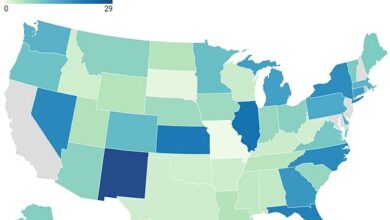Daily Mail health reporter goes vegan for a month after tests showed she was at risk of serious illness. What happened next shocked her… but left her miserable








I like to think I’m in pretty good shape. Not great, but pretty good.
I walk for almost an hour every day during my lunch break, cycle to work twice a day and go to the gym regularly.
I cook a balanced diet of protein, grains and vegetables almost every night, prep meals and try to limit my alcohol consumption.
It’s not perfect, but it generally works well, or at least I thought it did.
A few weeks ago a blood test showed that I had high LDL (bad) cholesterol, elevated levels of fats called triglycerides, and elevated glucose levels.
All of these factors together can cause fat to build up in my arteries and my blood sugar levels to rise, which can lead to diabetes, heart disease, and stroke, among other things.
“Does high cholesterol run in your family?” asked the IVDrips team who performed my test.
It doesn’t – and it’s not something I, as a generally healthy 28 year old, had really thought about. Even the doctor said it was ‘odd’ that this would be elevated at my age.
I have to admit that I had become a bit lazy when it came to eating and exercise.
When planning a wedding, I spent more evenings organizing table settings and ordering food than I did preparing a meal and exercising.
Yet I felt fear rising at the thought that I was already at high risk for a lot of chronic diseases (after all, I already have a lot of minor health problems).
Around that time, DailyMail.com reported on a number of new studies touting veganism as a diet that lowers cholesterol and inflammation.
I needed some new motivation and was shocked by the results of my tests, so this was a good time to go vegan for three weeks.

This was my go-to for weekend breakfast: plant-based eggs with spinach and chili oil, plus Beyond sausages. I’m not much of a breakfast eater, but I was missing eggs and bacon
The goal wasn’t to lose a huge amount of weight or completely overhaul my lifestyle, but to see if a vegan diet could match its health benefits.
My “last meal” consisted of everything I had to swear off until now: McDonald’s chicken nuggets, fries (which are fried in beef fat for some reason), and a vanilla shake.
When I started stocking up on whole food plant-based foods, I started to regret not just going vegetarian or doing something less restrictive.
With ‘substitutions’ like fake meat and cheese, I immediately noticed changes in texture and taste.
One night I swapped the regular cheeseburgers for Beyond Burgers with dairy-free cheese from Violife.
The cheese, if we can call it that, felt like you were biting into a slab of rubber that smelled faintly of cheddar when you brought it to your mouth.
But it lacked real flavor.
The opposite was the case with Beyond Meat. The flavor seemed to be overly seasoned to hide the fact that it wasn’t beef.
It also had a slightly pungent odor, somewhat reminiscent of my cats’ food.
Meanwhile, I had to watch my fiancé’s classic American cheeseburger being cooked in a separate pan. My mouth nearly watered at the sight of real cheese actually melting.
The cheese on my pizza never fully melted and it was nearly impossible to get the burger to get a nice black color without it getting completely burnt.

My fiancé’s regular beef burger with cheddar on the left, and my Beyond patty with Violife ‘cheese’ on the right (plus Hidden’s Valley plant-based ranch dressing)

Perhaps the most pathetic hot dog out there, this meat substitute tasted the closest to the real thing – possibly because hot dogs are a fusion of ‘mystery meat’ anyway
The only meat substitute that could actually pass for real meat was a hot dog from my regular bar.
For $2 extra I could actually enjoy a beautiful spring day outside with a hot dog and beer.
The appearance left something to be desired; the dog looked paler and drier than most I’d had, but I forgot for a moment how much I missed real meat.
It doesn’t help that recent research shows that eating vegan meat is linked to a 15 percent increased risk of heart attacks and strokes, as well as premature death.
But I found that I felt least miserable when I stopped replacing animal products with products that resembled them.
One of the most delicious meals I ate was a chickpea and spinach curry with coconut milk and spiced lentils on rice, which I prepared two weeks into my trip.
But I also came across quite a few restaurants that barely had any vegan options, which surprised me since I live in New York.
At an event I could only eat one thing on the menu: pita and hummus. When I got home I had to make a whole different dinner.
And when I was out for a birthday party, I had to throw together a lunch consisting of couscous and a portion of broccoli.
On my last night as a vegan, a friend took it upon herself to prepare my ‘last meal’: Broccoli farro stew with capers and parsley.
This was by far the best meal I’ve had in three weeks.
After nearly a month of dreaming about real cheese and a big, greasy hamburger, I finally reached the end of the experiment.
Even after a relatively short time, there were differences in my body. My LDL cholesterol dropped by seven percent, still on the high side, but back within the normal range for someone my age.
My triglycerides — fats that circulate in the blood and come from foods like butter and oils — dropped by 15 percent, bringing them back to healthy levels. And my glucose dropped by six percent — though it remained borderline normal.

Although this restaurant offered a wide variety of vegetarian meals, there were few vegan options, so I opted for green and more green

The last (and best) meal of my experiment: Broccoli farro soup with capers and parsley
I was honestly impressed with the reduction in my cholesterol levels after just a few weeks of veganism, without having to take any medications.
Research in the journal Nutrition ReviewsHowever, it did show that dietary changes, such as adding fiber and reducing fat, could lower cholesterol levels in about four weeks.
However, drugs like statins remain a tried-and-true way to lower cholesterol. According to Yale Medicine, these inexpensive medications, taken by nearly 50 million Americans, can lower levels by 30 to 50 percent. And some drugs, like Crestor, claim to lower levels in as little as two weeks.
Although it has been shown that diet can improve cholesterol levels, many people also need medication.
My vitamin D levels, which had been low for a while, also rose slightly, but I was still deficient and was told to ‘supplement’ daily.
However, some levels performed worse after animal products were eliminated.
My iron levels dropped by more than 30 percent, putting me below the normal range.
Iron is abundant in several animal products that I had eliminated from my diet, including eggs, chicken, beef, turkey, salmon, and eggs. This could explain why my iron levels dropped.
While I’m thankful that my cholesterol levels are back in the normal range, I know I need to keep a closer eye on them to keep them from spiraling out of control again.
But I can do that much better by adding more plant proteins, like legumes, to my diet, eating less fast food, and exercising a few extra times.
I missed cheese too much to ever give it up.




